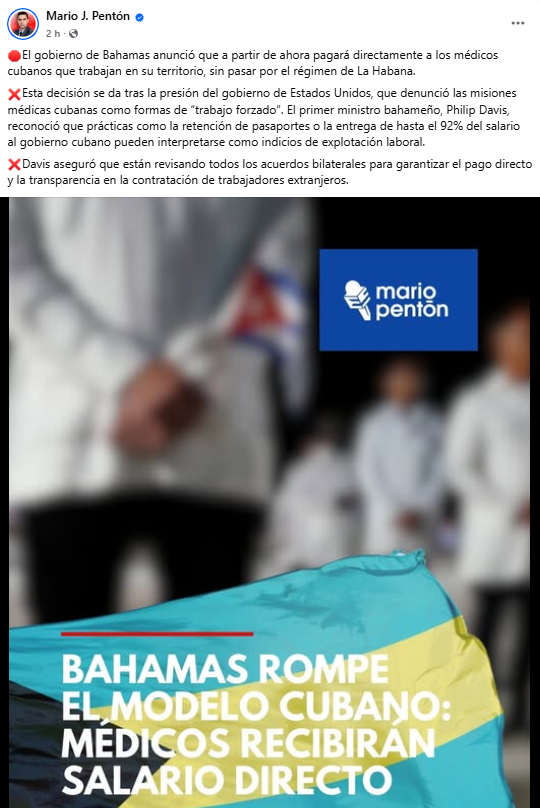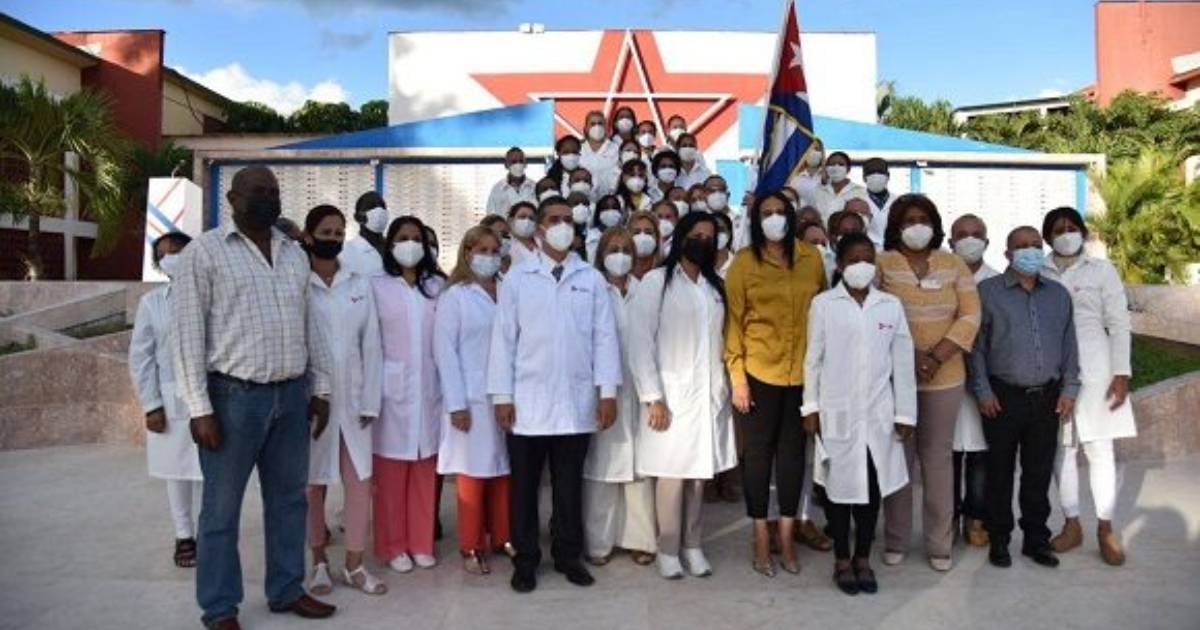The government of the Bahamas has decided to pay directly to the Cuban doctors providing services in the country, official sources announced.
This measure comes in response to the pressures exerted by the administration of U.S. President Donald Trump, particularly from Secretary of State Marco Rubio, who has repeatedly criticized the agreements that allow Cuba to send healthcare professionals abroad.
At a press conference in the Diplomatic Lounge of Lynden Pindling International Airport, the Prime Minister of the Bahamas, Philip Brave Davis, announced that his government is renegotiating labor agreements with Cuba and will directly pay all foreign workers contracted by the government, reported The Nassau Guardian.
Davis explained that this measure is part of an effort to ensure that foreign workers are not victims of forced labor.
“We were able to tell them, and I believe they were satisfied, that we are not involved in any forced labor of which we are aware”, Davis told Rubio during a meeting they held last Monday.
The Bahamian Prime Minister stated that he is not aware if forced labor is occurring in his country involving Cubans.
According to his statement, no evidence has been found regarding this matter, although he declared that in recent weeks, they have been focused on identifying what he referred to as elements of forced labor to see if any of them are related to the workers here in the Bahamas.
“If we discover that, we will correct it”, he said, although he did not rule out that the fact of “sharing an employee’s salary with a government could be perceived that way”.

Facebook Capture/Mario J. Pentón
Davis’ announcement follows the visa sanctions imposed in February by the U.S. Secretary of State, Marco Rubio, against governments participating in Cuba’s medical missions, which he has described as a form of modern slavery.
The Prime Minister also stated that they are renegotiating all the memorandums of understanding regarding Cuban labor, just as they are doing with other countries like the Philippines.
Davis concluded by pointing out that the Caribbean leaders have requested that the United States share any information it has regarding forced labor to address it properly.
According to a report from the project Archivo Cuba, based on unofficially leaked contracts, the Havana regime retains between 83.9% and 91.6% of the money that Bahamas pays for each Cuban health professional. The collaborators receive only a modest monthly stipend, while the bulk of the payments goes to the Commercializadora de Servicios Médicos Cubanos (CSMC), a Cuban state entity.
For example, the contract stipulates that the Bahamas pays up to $12,000 monthly for each “medical specialist advisor,” of which only $1,200 reaches the worker. In the case of health technicians or computer engineers, the Caribbean nation disburses $5,000 per month, but the stipend received by the Cuban professional barely reaches $990.
These payments are supplemented with additional benefits such as housing, transportation, health insurance, English courses, and administrative expenses, which increase the total cost for each worker beyond the average local salary. Currently, more than 100 Cubans are employed in hospitals and health institutions in the Bahamas, such as Princess Margaret and Rand Memorial.
The report also denounces that many professionals are subject to restrictive clauses that prevent them from accepting independent contracts, require them to maintain confidentiality, and even expose them to disciplinary sanctions from Cuba. It further indicates that some work without valid immigration permits and are obligated to participate in political demonstrations organized by the Cuban embassy.
Frequently asked questions about hiring Cuban doctors in the Bahamas
The Bahamas decided to pay Cuban doctors directly to avoid forced labor practices and in response to pressures from the United States, specifically from Secretary of State Marco Rubio. Rubio’s administration has criticized the agreements that allow Cuba to send healthcare professionals abroad, describing them as a form of modern slavery.
According to a report from the Cuba Archive project, the Cuban regime retains between 83.9% and 91.6% of the money that Bahamas pays for each Cuban healthcare professional. This means that doctors receive only a small fraction of their salary, while the rest goes to the Cuban Medical Services Marketing Agency (CSMC), a state entity in Cuba.
The United States has imposed visa restrictions on government officials linked to Cuban medical missions, labeling them as a form of labor exploitation and human trafficking. Marco Rubio has spearheaded these actions, arguing that the missions operate under conditions of forced labor.
The Cuban government has rejected the criticisms and sanctions from the United States, branding them as unjustified aggressions aimed at harming the Cuban people. Miguel Díaz-Canel and other Cuban officials have defended medical missions as a form of solidary international cooperation, despite allegations of labor exploitation.
